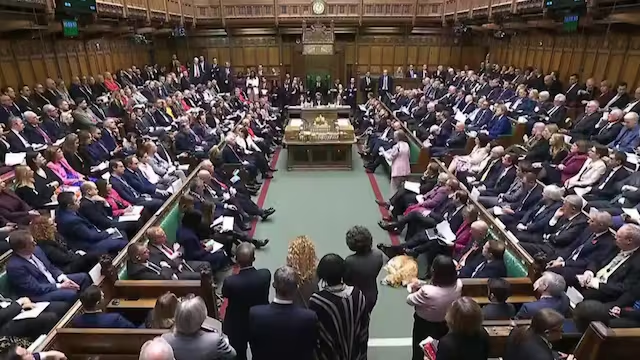



The UK House of Commons approved a bill to legalize assisted dying in England and Wales. The legislation allows mentally competent adults with a terminal illness and less than six months to live the choice to end their lives with medical help. The bill now moves to the House of Lords for further review.

Copyright infringement not intended
Picture Courtesy: NEWS18
The United Kingdom's House of Commons recently passed a bill that proposes to legalize assisted dying for terminally ill adults.
Assisted dying refers to the practice where a person who is suffering from a terminal illness is provided with the means (such as a prescription for a lethal dose of medication) to end their own life.
Assisted Dying v/s Euthanasia
In assisted dying, the patient must administer the life-ending substance themselves. The role of the medical professional is to provide the means and ensure the patient is eligible.
In euthanasia, a third party, commonly a doctor, directly administers the lethal substance to the patient at their request. The bill in the UK Parliament is for assisted dying, not euthanasia.
The "Terminally Ill Adults (End of Life) Bill" outlines a strict set of criteria that must be met for a person to be eligible for an assisted death.
Eligibility Criteria
Terminal Illness => The person must be diagnosed with a terminal illness and have a life expectancy of six months or less.
Mental Competence => The individual must be deemed mentally competent to make the decision, meaning they understand the implications of their choice.
Residency => The person must be an adult resident in England or Wales.
Safeguards in the Process
Independent Approval => The request must be approved by two independent doctors to confirm the diagnosis, prognosis, and the patient's mental capacity.
High Court Declaration => A High Court judge must review the case and make a declaration, confirming that the person is making a voluntary and informed choice without pressure.
Patient's Final Action => The patient must self-administer the prescribed medication.
|
The bill was passed in the House of Commons. The bill now moves to the House of Lords (the upper chamber) for further detailed examination, debate, and potential amendments. If the House of Lords approves the bill, it will then go for Royal Assent to officially become law. |
Personal Autonomy => Individuals have the right to make decisions about their own body and life, especially when faced with unbearable suffering from a terminal illness.
Compassion and Dignity => It allows people to have a peaceful and dignified death, avoiding prolonged pain and loss of quality of life.
Regulation of an Existing Reality => Proponents argue that some forms of assisted dying already happen unofficially. Legalizing it would bring transparency and robust safeguards.
Sanctity of Life => Many religious and ethnic groups believe that life is sacred and should not be intentionally ended.
Risk to Vulnerable People => There are fears that elderly, disabled, or depressed individuals could be pressured, either directly or indirectly, into choosing an assisted death.
The "Slippery Slope" Argument => Opponents worry that legalizing it for a narrow group could lead to gradual expansion of eligibility criteria over time, as seen in some other countries.
Palliative Care Alternative => The focus should be on improving palliative (end-of-life) care to manage pain and suffering effectively, making assisted dying unnecessary.
|
Several countries, including Canada, Switzerland, Belgium, the Netherlands, and some states in the US and Australia, have legalized some form of assisted dying or euthanasia. |
Position in India
In India, euthanasia is illegal. Actively ending a person's life is a crime under the Indian Penal Code. However, in the Common Cause v/s Union of India case (2018), the Supreme Court of India legalized passive euthanasia.
Passive Euthanasia means withdrawing life-sustaining treatment (like a ventilator) from a person in a permanent vegetative state, allowing them to die naturally. This is permitted through a legally binding "living will" or an application from the family to the High Court.
The Supreme Court legalized the concept of an "advance medical directive" or "living will." This allows a mentally competent person to state in advance that they do not wish to receive medical treatment if they fall into an irreversible coma in the future.
Must Read Articles:
Assisted Dying in UK v/s India
Source:
|
PRACTICE QUESTION Q. Consider the following statements: 1. The Supreme Court in the Aruna Shanbaug v/s Union of India (2011) case legalized active euthanasia for patients in a persistent vegetative state. 2. The Supreme Court in the Common Cause v/s Union of India (2018) case recognized the legality of "advance medical directives" or "living wills." Which of the above statements is/are correct? A) 1 only B) 2 only C) Both 1 and 2 D) Neither 1 nor 2 Answer: B Explanation: Statement 1 is incorrect: In the Aruna Shanbaug case, the Supreme Court legalized passive euthanasia, not active euthanasia, for patients in a permanent vegetative state. Statement 2 is correct: In the Common Cause case, the Supreme Court recognized the legality of "advance medical directives" or "living wills." This judgment empowers individuals to make a conscious decision in advance about the medical treatment they wish to receive if they become terminally ill or are unable to communicate their wishes in the future. |



© 2026 iasgyan. All right reserved